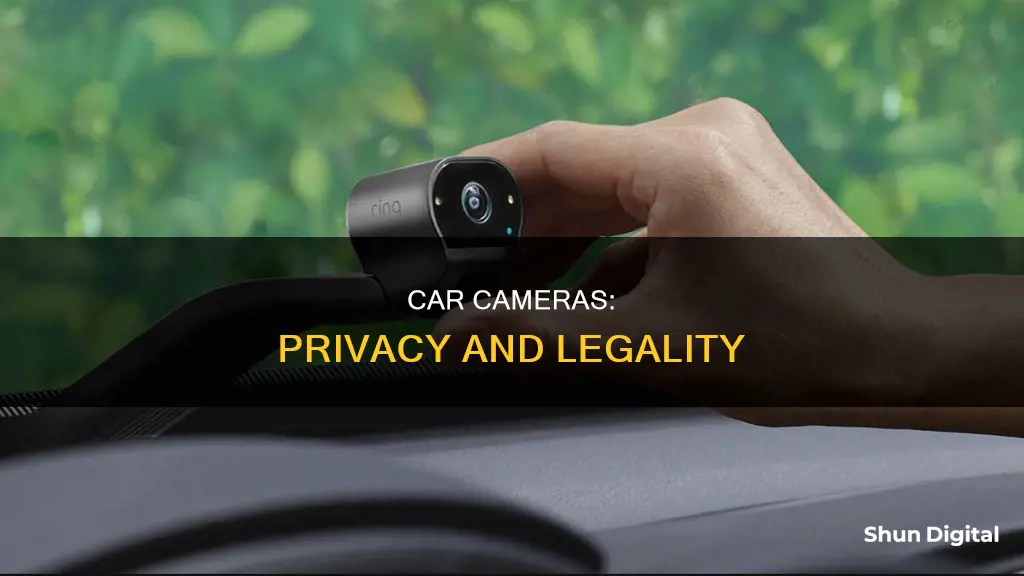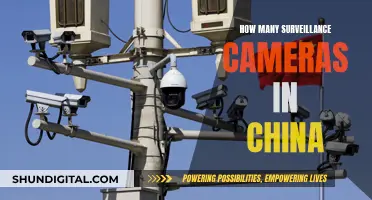
The legality of having a camera in your car varies depending on your location and the type of camera. In the US, for example, dash cams are legal, but there are restrictions regarding installation and placement that vary from state to state. The most common restriction is that the dashcam cannot obstruct the driver's vision through the windshield. In the UK, there are no specific laws prohibiting the use of dashcams, but there are general guidelines that must be followed, such as ensuring the camera does not obstruct the driver's view.
| Characteristics | Values |
|---|---|
| Legality | In most states, it is legal to have a camera in your car. However, there are restrictions regarding installation and placement which vary from state to state. |
| Installation and Placement | In some states, dash cams must be placed in the bottom corner of the passenger side and cannot block more than a specified number of inches of the windshield from view. |
| Audio Recording | In some states, it is illegal to record audio conversations without the consent of every person involved in the conversation. |
| Private Property | In some states, it is illegal to record footage while trespassing on private property. |
What You'll Learn
- Recording video in a public place is usually legal without consent
- Recording audio without consent is illegal in most states
- Recording on private property is usually illegal without consent
- Dash cams are usually unlawful if they obstruct the driver's view
- Dash cams are illegal in some countries due to privacy concerns

Recording video in a public place is usually legal without consent
However, there are certain places with expected levels of privacy where recording is not allowed, such as bathrooms and dressing rooms. In these places, individuals have a reasonable expectation of privacy, and recording without consent is illegal.
Additionally, it is important to note that the laws regarding recording in public may vary depending on the state or country. For example, in the United States, there are "one-party consent" states, where only one person needs to consent to the recording, and "all-party consent" or "two-party consent" states, where all parties involved need to consent to the recording.
It is also worth mentioning that while recording video in public may be legal without consent, recording audio without consent is often subject to stricter laws and restrictions. In most states, audio surveillance without consent is illegal, especially in areas where there is a reasonable expectation of privacy.
Crafting Camera-Friendly Paper: Secrets of Positive Paper Making
You may want to see also

Recording audio without consent is illegal in most states
The use of cameras in cars has become a popular trend, especially with the rise of vlogging and the desire to capture footage for personal injury cases. While it is generally legal to have a video camera in your vehicle, there are important privacy considerations to keep in mind, especially when it comes to audio recording.
In "One Party Consent" states, only one person involved in the conversation needs to consent to the recording. This means that if you are part of the conversation, you don't have to notify others that they are being recorded. The District of Columbia falls under this category.
On the other hand, "All-Party" or "Two-Party Consent" states require the consent of all parties involved in the conversation. Even if the individuals are in a public space with no reasonable expectation of privacy, their consent is still necessary. Examples of two-party consent states include:
[List of specific states was not found in the sources]
It's important to note that the laws regarding audio recording may vary from state to state, and it's always a good idea to check the specific laws in your state before engaging in any recording activities.
Additionally, it's worth mentioning that recording video without audio is generally legal in public spaces, as there is no reasonable expectation of privacy. However, if you intend to profit from any recordings that include another person's image, you must obtain their permission to avoid violating their right of publicity.
Repairing Camera Batteries: A Step-by-Step Guide
You may want to see also

Recording on private property is usually illegal without consent
Recording on private property is typically illegal without consent. In most cases, it is illegal to record audio of a conversation between two other people without their knowledge. This is because everyone has a right to privacy, and recording people without their consent is a breach of privacy laws.
However, the laws regarding recording in public spaces are more relaxed. For example, in most places, it is legal to record video in a public space, such as on a sidewalk or in a public park, as there is no reasonable expectation of privacy.
The same is true for private property, but only if you have the consent of the property owner. If you are recording on private property without the owner's consent, they can ask you to leave and charge you with trespassing if you refuse.
It is also important to note that the laws regarding recording conversations may vary depending on your jurisdiction. For example, in Canada, it is legal to record a private conversation as long as one of the parties involved consents to the recording. However, in the US, the laws vary from state to state, with some states requiring the consent of all parties involved in the conversation for the recording to be legal.
Overall, it is essential to understand the laws in your specific jurisdiction and to respect the privacy of others.
Troubleshooting Camera Issues: Computer Registration Fix
You may want to see also

Dash cams are usually unlawful if they obstruct the driver's view
Dash cams are generally legal in the US, but there are restrictions on installation and placement that vary from state to state. The most common restriction is that dash cams must not obstruct the driver's vision through the windshield.
In some states, such as Alabama, suction dash cams are prohibited as it is illegal to place anything on a vehicle's windshield. In other states, such as Arizona, there are specific regulations governing the placement of dash cams on the windshield. For example, in Arizona, dash cams must be located in the lower corner of the windshield and must not take up more than five square inches of space. Similar regulations exist in California, where dash cams must not take up more than five square inches of space when installed in the top center of the windshield and no more than seven square inches when installed in the bottom right corner.
In states like Connecticut, Delaware, and Florida, dash cams cannot be placed on the windshield and must instead be mounted on the dashboard or behind the rearview mirror. This is to ensure that the driver's view is not obstructed.
In addition to restrictions on placement, some states have laws regarding the recording of audio. In these states, it is necessary to obtain permission from everyone in the vehicle before recording their voices.
Overall, while dash cams are generally legal, it is important to be aware of the specific laws and regulations in each state to ensure compliance and avoid any legal issues.
Charging Your SLS Camera: A Step-by-Step Guide
You may want to see also

Dash cams are illegal in some countries due to privacy concerns
In Europe, for example, there is a diverse range of attitudes towards dash cams. While some countries like Russia have widespread dash cam usage due to issues such as police corruption, unsafe road conditions, and high accident rates, other countries in the region have banned the devices outright. Austria, Luxembourg, and Portugal are among the European countries where the use of dash cams or recording devices in public is illegal, with heavy fines imposed on violators.
The primary concern in these countries is the infringement of privacy. France and Belgium address this issue by permitting dash cams for private use only and prohibiting users from uploading footage to public online platforms. Germany allows dash cam footage to be used as evidence in court but requires any personal imagery, such as license plates and faces, to be obscured to protect privacy.
Other European countries, including Switzerland, Greece, Hungary, and Ukraine, have their own unique regulations regarding dash cam usage. Switzerland restricts the use of dash cams to legal purposes only, while Greece restricts publication on the internet, allowing footage to be used only in courts. Hungary has unusual requirements for low frame rates and low resolutions, with users mandated to delete footage within five days and prohibited from publishing it. In Ukraine, dash cam users must obscure other vehicles' license plate numbers to prevent insurance fraud, and they can only share footage that primarily contains accident-related content.
While dash cams are not explicitly mentioned, the legal considerations surrounding them often involve privacy and consent laws, as well as safety concerns related to the driver's field of vision.
Understanding Raw File Support in Modern Cameras
You may want to see also
Frequently asked questions
No, it is not illegal to have a camera in your car. However, there are restrictions regarding installation and placement that vary from state to state.
Yes, you can record video inside your car as long as it is done in a place and circumstance where there is no expectation of privacy. For example, you cannot record video in a bathroom, locker room, changing room, hotel room, or guest bedroom without consent.
The laws around audio recording vary by state. In some states, you must obtain consent from everyone in the vehicle before recording their voices. In other states, it is legal to record conversations as long as one of the people involved is aware and gives consent.
Yes, you can record video while driving as long as you use a hands-free camera with a mount and start recording before you begin moving. However, it is important to plan your route and what you want to say in advance to stay safe and within legal limits.
No, this is generally illegal. There are many factors that determine the legality of recording audio without consent, and it is important to research the specific laws in your state.







